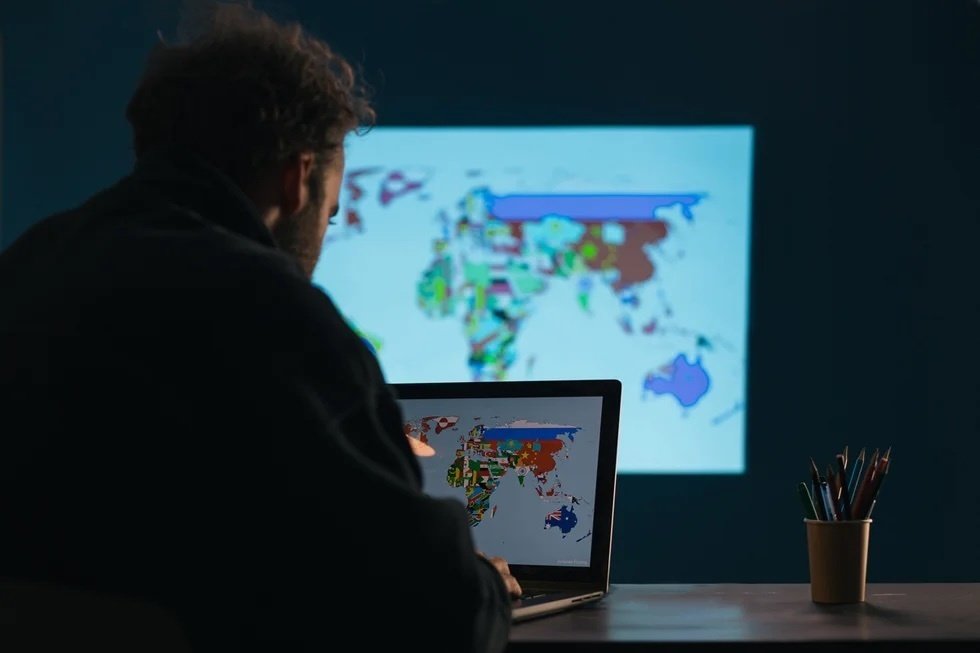Wanderlust with a conscience: Ethical considerations for digital nomads
02. 4. 2024
6 min.


Journalist
Four years ago, the world of work as we knew changed in an instant. As both borders and offices closed, millions of workers found themselves shifting to a remote work lifestyle overnight. What started as a temporary health and safety measure quickly came to feel like a new cultural norm. Many professionals realized that most if not all of their work could be done remotely without much need to commute to the office. Adapting to this new way of work came with its challenges, but also created amazing benefits to productivity and work-life balance thanks to the freedom of newfound flexibility.
Working from home allowed people to spend more time with family, avoid daily commutes, work in their own unique environments, and find their own rhythm to get through the workday. This change didn’t only see workers leaving the office, but the city as well. With the freedom to work from home, many Americans decided to pack their bags and head for greener pastures in less urban areas or wherever else their hearts desired. Fast forward to today, and the trend of digital nomadism is growing faster than ever. With the current cost of living crisis and changing perceptions around career ambitions and work-life balance, many people are considering taking remote work one step further by leaving the continental US altogether.
Some nations decided to take advantage of the flexibility of remote work as an opportunity to attract foreign workers in an attempt to boost struggling economies. These so-called “digital nomad visas” cater specifically to foreign citizens who wish to move abroad while working remotely for a company in their home country. The idea seems like a win-win: foreign workers get to live a “slower” lifestyle abroad, experiencing new cultures and enjoying a lower cost of living, while the states that offer these visas have a new tax revenue stream and an influx of American salaries to boost local economies. However, the recent cohorts of digital nomads are beginning to cause problems with locals being priced out of their homes as their communities are gentrified by waves of wealthy Americans looking to put their stamp around the world. Three of the most popular destinations for digital nomads from the US are Hawaii, Mexico, and Portugal. Each of these places has much to offer and a unique history that contextualizes the impact of digital nomadism on their inhabitants. So, if you’re considering taking a remote job in one of these places, take a moment to consider the ethics of your decision …
Working remotely from Hawaii
For those dreaming of a different life, Hawaii was an obvious first choice for many remote workers in the US. Its turquoise waters and verdant, mountainous forests seemed like the perfect place to put down roots as a digital nomad. Its distance from continental America and rich culture gave American workers the same sense of adventure and change that comes with moving abroad without the hassle of finding a visa, learning a foreign language, or any other challenges that come with emigrating. However, for native Hawaiians, this seemed like the beginning of an unwelcome new chapter in their long colonial history. Within 100 years of the first colonists arriving on the islands, the native population shrank from 300,000 to 70,000 as American businessmen took control of the Hawaiian economy, deposed the monarchy, and aided a military militia in annexing the islands into US territory.
Since then, Hawaii has gained statehood and become home to a booming tourism industry in recent decades. Unfortunately, rampant tourism has priced Indigenous people out of their homes, and seen much of the natural landscape commercially developed. Now, native Hawaiians see digital nomadism as bordering on neocolonialism as wealthy Americans set up camp for good, using more and more of the islands’ finite resources. The amount of remote workers in Hawaii has more than doubled since the pandemic, and residents are feeling the effects of the increase with home prices soaring to nearly three times the national average, requiring local governments to create new housing initiatives as homelessness and cost of living continue to increase.
Working remotely from Mexico
Like Hawaii, Mexico also has much to offer when attracting foreign workers. Its climate, culture, and proximity to the United States are all pros when it comes to American workers looking to become digital nomads. Although it doesn’t have a visa specifically for digital nomads, Mexico’s Temporary Residence Visa usually fits the bill. This visa seems to be an easy in for those looking to cross the border—all you need is proof of income and you will receive a temporary visa for 180 days, which can later be converted into a permanent residency card.
As of last year, an estimated 1.6 million Americans are currently living in Mexico, with visa requests increasing by 70% over the past four years. While remote workers from the US contribute over half a billion dollars per year to the Mexican economy, locals are less than happy with the recent influx of migrants from their northern neighbor. Mexico City, the nation’s capital, has become a hotbed for US citizens looking to save on rent or improve their work-life balance.
One of the biggest issues for native residents has been a surge in Airbnb. With the number of short-term rentals increasing by 189%, many longtime inhabitants are being priced out of their neighborhoods or forced out of their homes by landlords looking to take advantage of the digital nomad boom. Although the government has imposed higher taxes on Airbnb rentals, it doesn’t create a direct solution for locals struggling to find housing. Along with the economic impact, many Mexicans are becoming fed up with the cultural gentrification of Mexico City as English becomes more common and local businesses begin to cater to Americans. Residents are beginning to express their anger online and in the streets, with flyers popping up around the city that read, in English, “New to the city? Working remotely? You’re a f—ing plague and locals f—ing hate you. Leave.”
Working remotely from Portugal
Across the Atlantic, Portugal is facing many of the same issues as Hawaii and Mexico. Unlike the previous destinations, Portugal is unique in the fact that it actually sought to encourage expats to make a new home in this small, coastal country. In 2012, the government created what’s referred to as a “golden visa” which allows non-EU citizens to gain residency by investment. By simply purchasing a home in the country, foreign nationals would gain residency and the right to work in Portugal. This was done in an attempt to boost the economy and increase investment in a dilapidated real estate market. However, the result was far from ideal as housing prices have doubled since 2015, and locals are priced out of historic cities like Lisbon and Porto while Americans continue to pour in. This year, in an effort to quell the rising cost of living, the government removed the housing investment option, but there are still easier ways for Americans to gain residency. Digital nomads can still qualify for a D8 Visa if they earn a monthly income of €3280—a salary not out of reach for most people employed by a US-based company.
What questions should you ask yourself before going nomad?
While digital nomadism may seem like the dream for many Americans, the reality for residents already inhabiting these booming locations is not as glamorous. This isn’t to say digital nomadism is inherently wrong or harmful, as it does certainly have benefits for countries opening doors for American workers. The key is to make sure you have the right motivations and vision for what life in one of these places will be. So, what are some ethical considerations you should reflect on before making the leap to pack up your life in the US?
1. Why do you want to move?
There’s no arguing that the digital nomad lifestyle in many of these beautiful destinations is incredibly appealing to Americans who feel bogged down by the careerist culture in the US, but it’s important to think about why you really want to move to a remote work hotspot. If your answer is simply to stretch your dollar further or lounge by the beach after a day of work, you may want to dig deeper into why you are looking at a specific location, as you can find both of those things in the continental US.
2. Can you picture yourself there long-term?
Another important factor to consider is how long you see yourself living in one of these places. The short-term rental market is one of the leading causes of gentrification in places like Mexico and Hawaii, so if you’re not planning to stay for the long haul and put down roots in your new community, it may be worth reconsidering before you contribute to this growing crisis.
3. How will your presence impact the existing community?
Apart from the economic impact digital nomads have on communities, we need to be aware of the cultural influence American expats have when they move abroad. While it’s easy to quantify changes in the cost of living, the way foreign workers impact local culture is more obscure. Before making your move, think about how you plan to interact with your new community. Do you have family, friends, or some sort of cultural connection there? Do you want to immerse yourself in the local customs and traditions or learn the language? If you see yourself trying to recreate your US-based way of life while taking advantage of more affordable destinations, you may want to think twice about how your presence will affect the people who live there.
Photo: Welcome to the Jungle
Follow Welcome to the Jungle on Facebook, LinkedIn, and Instagram, and subscribe to our newsletter to get our latest articles every week!

Viac inšpirácie: Hľadanie práce

Family first: What working parents should look for in potential employers
Are you a working parent struggling to balance career and family? Here’s how to find the perfect company for your needs.
17. 4. 2024

Can you keep up with AI? Here are 3 skills job hunters need today
How can you enhance your career in the age of AI? These skills that technology can't replace are key …
15. 4. 2024

Want a remote job? Here are the top 10 fully remote roles hiring right now
Explore the most in-demand fully remote jobs of 2024.
11. 4. 2024

5 signs you're ready to change careers
Ever feel like you’re just not the right fit for your current career? These 5 indicators may help you decide if now is the time to make a change.
25. 3. 2024

Faking it vs. fraud: Navigating the thin line in today’s hyper-competitive job market
In a competitive job market, the temptation to stretch the truth can be high. But where’s the line between enhancing your profile and outright lying?
20. 3. 2024
Novinky, ktoré to vyriešia
Chcete držať krok s najnovšími článkami? Dvakrát týždenne môžete do svojej poštovej schránky dostávať zaujímavé príbehy, ponuky na práce a ďalšie tipy.

Hľadáte svoju ďalšiu pracovnú príležitosť?
Viac ako 200 000 kandidátov našlo prácu s Welcome to the Jungle
Preskúmať pracovné miesta